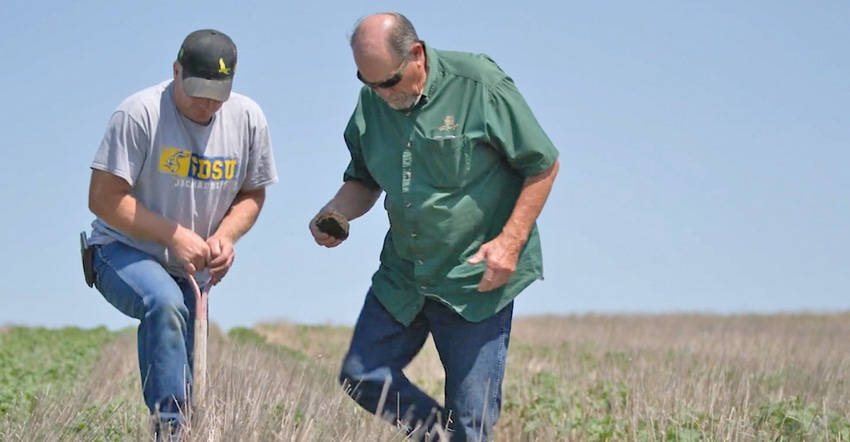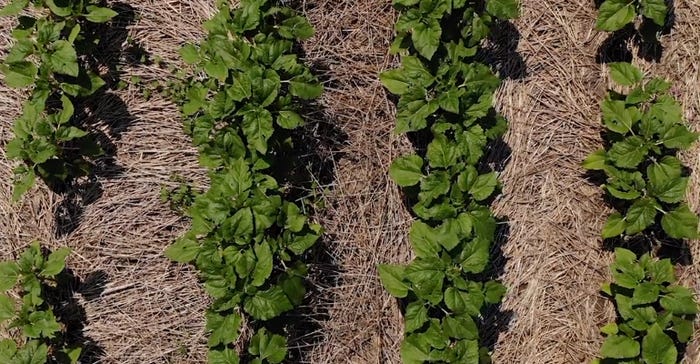February 12, 2021

Editor’s note:This is the third of seven stories on the relationship between landowners and tenants, and how soil health goals can be achieved more efficiently if both parties are on the same page.
When Barry Ploog stopped actively farming about 13 years ago, he didn’t make a snap decision on who the tenant would be on his Corson County farm in South Dakota. He’d been watching his neighbor, Mike Beer, for several years, and liked what he saw.
“I had questioned how I would get out of farming, because I could see it was coming down the road,” Ploog says. “Mike and I farmed beside each other in his younger years when he was starting out. I was still an old school farmer. My dad and his dad were tillers. But I saw Mike gradually getting into no-till. After a few years, I could see I'm out there summer following, and turning up rocks and watching my land blow away. Little by little, his just kept getting better and better. I knew that was the way of the future.”
Picking right person
Ploog was getting up in age, and his sons weren't interested in farming. “When the opportunity came to rent out, I had several others that were interested in it, but I picked Mike because I could see the job he was doing,” he says. “I haven't looked back, haven't regretted a day of it. Mike made it easy for me. I could see his practices and how beneficial it was for the ground.”

Beer has been part of a generation that’s seen a big switch to no tillage. “When I did my senior seminar on no-till farming in western south Dakota, there wasn't anybody doing it here. I would guess 95% of the area is no-till farming now,” Beer says. “Over the last five years, the trend has changed a little bit where we have had landowners that were actually seeking us out. They wanted us to farm their land because they saw some of the things that we were doing and that was important to them. Earlier, it was probably more farmer-driven, but now I think the landowner and the farmer are both seeing that it's beneficial to them.”
Doubling production
“I guess the biggest change you would notice right away if you saw it on paper was a yield of probably 20 bushels of wheat when I farmed to probably a 45-bushel-an-acre average now. You know production just doubled, and there's not any weeds anymore,” Ploog says. “And it's good for the land because there's not the erosion there was when I was farming. You don't see the wind blowing your soil away and the gullies getting washed out and the rocks being turned up. It's all contained and managed way better than when I farmed.”
Beer says he was farming all his land with no-till by 1996, and that he’s added quite a few other practices that contribute to soil health since. “I've been fortunate to have very good landowners to rent from that have been very easy to work with,” Beer says. “When we had some tougher years, they took a little less in rent. I’ve increased the value of their land, and it's been good for both parties.”
Farming for future
Ploog is confident Beer will do what’s needed to take care of his land. “I know he's conscientious about that, and he's not going to do something to the soil if it's not for the betterment of it. That's how he is,” Ploog says. “I'm just real pleased with how my land looks and couldn't have picked a better operator. I'd tell other landowners if they were choosing someone to farm their ground to make sure they're a no-tiller, because it's just the only way to farm this country.”
Beer is on the same page with Ploog and says he’s in good company. “I think if a landowner wants the land farmed a certain way, there's enough good farmers out there doing good practices,” Beer adds. “If their renter isn't taking care of their land the way they want, it's not a problem to find someone close by that will.”
To hear their story visit South Dakota Non Operator Landowner.
Betts writes from Johnston, Iowa.
About the Author(s)
You May Also Like




